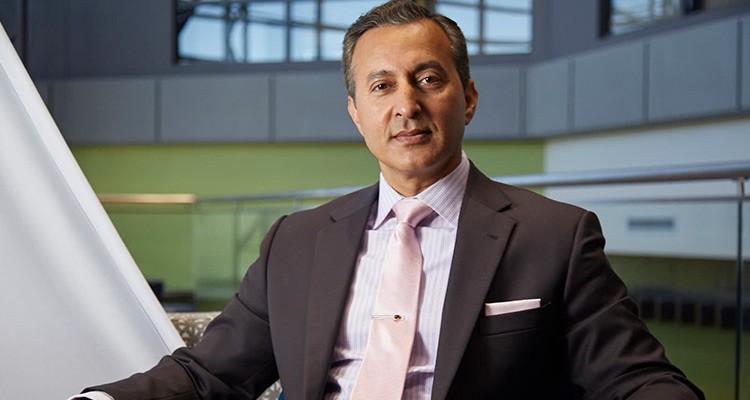- Executive Profiles
- Favorable Results in Unfavorable Conditions
- Featured
- Slideshow
- Transformational Leadership
Zimmer Biomet’s CIO Takes a Strategic Seat
When Zeeshan Tariq arrived at Zimmer Biomet, massive transformation was in the air.
It was July 2016, barely a year after Zimmer Inc., a 90-year-old medical device manufacturer, acquired Biomet Inc. in an approximately $14 billion deal. Suddenly a new company had arrived on the Fortune 500 list, with 18,000 employees spread across 25 countries.
Zimmer Biomet, based in Warsaw, Indiana, makes orthopedic implants, dental prostheses and other medical products for use by health care professionals in more than 100 countries. Sales were $7.9 billion in 2018.
When Mr. Tariq was brought on as CIO, his primary charge was to help Zimmer Biomet leverage new digital technologies in the emerging connected care space (telehealth and remote patient monitoring, for example). But before he could look to the future, urgent integration needs had to be addressed.
Mr. Tariq would need to immediately shore up the company’s IT infrastructure and tackle the much more difficult task of fundamentally altering how executives and employees perceived the role and value of IT at the company. He envisioned a transformation of the departmental culture occurring in tandem with Zimmer Biomet’s overall transformation.
But just as he had started pursuing his strategy, the ground shifted yet again. In December 2017, a new CEO took the helm. Bryan C. Hanson was charged with addressing quality control and supply chain problems, which had frustrated some investors.
Mr. Hanson was not the only new face. Some 70% of the company’s current executive team has come aboard since his arrival. Where other C-level executives might fear that this change would stymie their goals, Mr. Tariq saw an opportunity to make new connections and push his vision more deeply into the company.
Mr. Tariq, who previously worked at Medtronic for 17 years, spoke to IQ about his leadership approach and how he is building a new culture at a global company amid a time of tremendous transformation.
“Management is about business skills while leadership is about people. Most people don’t care how much you know, but they know how much you care.”
—Zeeshan Tariq, CIO, Zimmer Biomet
IQ: What was your original mandate when you joined the company?
Zeeshan Tariq: To help Zimmer Biomet become a transformational company vis-a-vis new digital capabilities and related market offerings. But when I did my initial analysis, it became abundantly clear that we needed to first ensure we had a solid technology foundation.
What I found at Biomet was an under-investment in IT capabilities. You can’t build anything on shifting sand. So integrating and strengthening foundational capabilities to ensure the business is run efficiently and effectively is predominantly where the energy has gone.
IQ: How was your role affected when your new CEO arrived with a change agenda?
ZT: Bryan is a very progressive, incredibly smart leader. He fully understands and appreciates the potential of technology to create differentiation and outright market disruption. He added IT to the executive team, so I have a seat at that table. By virtue of being there when important decisions are being conceptualized and made, you can have a technology footprint and thought process embedded into the decisions.
Traditionally, IT used to be a place where people would show up with a need. And you would just go back, build what they wanted and then bring it back to them.
Now, every single leader with P&L responsibilities has an IT member on their staff. IT has become more of a strategic trusted partner and consultant. For example, because we have a partnership with the leader of the supply chain, we’ve been able to develop a step-by-step road map for reinventing the company’s supply chain.
We started by first simplifying the processes and then implementing the technology, rather than the other way around. Without this relationship, people often assume technology is a silver bullet to fix problems, whereas process-related items usually need to be addressed first. We avoid those assumptions because we are plugged in. There are no surprises.
IQ: How do you rally teams around a strategic vision and drive engagement?
ZT: I firmly believe that management is about business skills while leadership is about people. Most people don’t care how much you know, but they know how much you care. People have an intuitive sense about this, so you can’t fake your way around it.
Everything starts with clarity of purpose. One of my favorite quotes is, “He whose life has a why can bear almost any how.” Our ultimate responsibility as leaders is to set the right targets. We spend a tremendous amount of time and energy in defining the why. Why should anyone care? Why should everyone want to be on the team?
I believe people are intrinsically motivated to win. I’ve never met anyone who liked to lose. We spend time in partnership with every team member to make sure they understand how they contribute directly to the company’s mission. We spend time in each region through various meetings and town halls. Then the challenge becomes aligning that motivation to organizational needs.
It comes down to the details of making sure everyone is positioned for success and that we’re asking them to do something that’s feasible.
IQ: How exactly do you instill a culture of purpose in your teams?
ZT: Zimmer Biomet operates under three pillars, and those definitely help build the culture. Our first pillar is being the best and preferred place to work. I often tell my teams that we spend more time in our life doing work than anything else. It makes sense to do everything in our capacity to create an environment that people want to be part of or can thrive in.
The second pillar is about being a “trusted partner” to all of our stakeholders. It’s just two words, but there’s lots, lots, lots in there. Because trust is something that is earned. It takes a lot of time to build trust and not much time to lose it. So the explicit focus on being a trusted partner creates a certain culture.
The third pillar is achieving top-quartile performance. I believe that if you take care of the first two pillars, the performance part takes care of itself.
IQ: What’s the best thing you’ve done to make IT a preferred place to work?
ZT: I have a quote here at my desk so I can see it every day: “After the game, the king and the pawn go in the same box.” It’s never, ever about you. It’s about the people. It’s easy to have communication flow one way—top-down.
So we created a “voice of IT team,” a very simple mechanism where people could submit their ideas or questions directly to anyone, including me. And my commitment to the entire organization was that I will directly reply to any submitted question or suggestion. A lot of great ideas have come from this process.

“Everything starts with clarity of purpose. Our ultimate responsibility as leaders is to set the right targets.”
—Zeeshan Tariq
IQ: How would you describe your leadership style?
ZT: Well, that’s probably better suited for my team to answer than me. But I’d say I operate from a set of principles designed to create the right mindset, the right culture and the right environment for people to thrive.
But I don’t believe there’s one best leadership style. I believe in situational leadership. For instance, when I joined Zimmer Biomet, my style was a bit more directive. I was certainly open to suggestions and participation, but mostly it was me directing and dictating what should be done.
“Our modus operandi is that behind closed doors, titles make no difference. We’re all equal, and the only rule is that once we leave the room everyone is on the same page.”
—Zeeshan Tariq
Now that we’ve been on this change journey for two and a half years, my style is a lot more collaborative. Our modus operandi is that behind closed doors, titles make no difference. We’re all equal, and the only rule is that once we leave the room everyone is on the same page. Share on X
So we speak candidly and we challenge each other, and through these exchanges we are able to have better outcomes.
IQ: Has the arrival of so many new leaders at Zimmer Biomet made your job easier or harder?
ZT: The positive momentum we already had gave us a lot of credibility with the leaders that are coming in. I don’t have to sell them on the concept of digital technology having big disruptive potential in our space. They get that. Our CEO speaks openly about us being a solutions company rather than just a medical device company.
But at the same time, the bar for IT, which was very, very low before, is now set very high. We don’t mind the pressure, though—my teams want to do great things. We have a tremendous advantage because our mission is to alleviate pain and improve the quality of life for people around the world.
That gives us a unique motivational power. If that doesn’t move you, then you’ve got to check your pulse, because something’s wrong with you.



